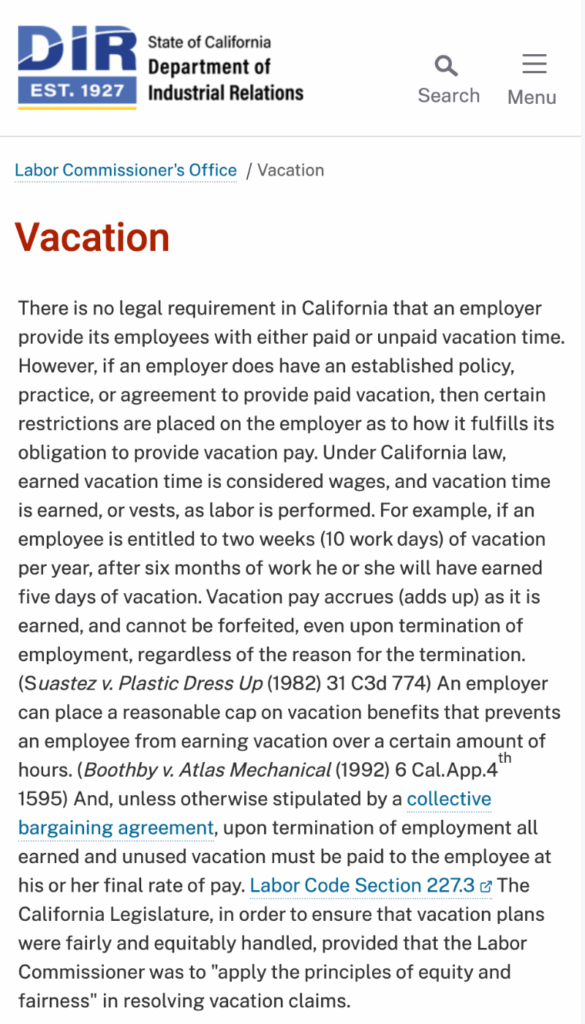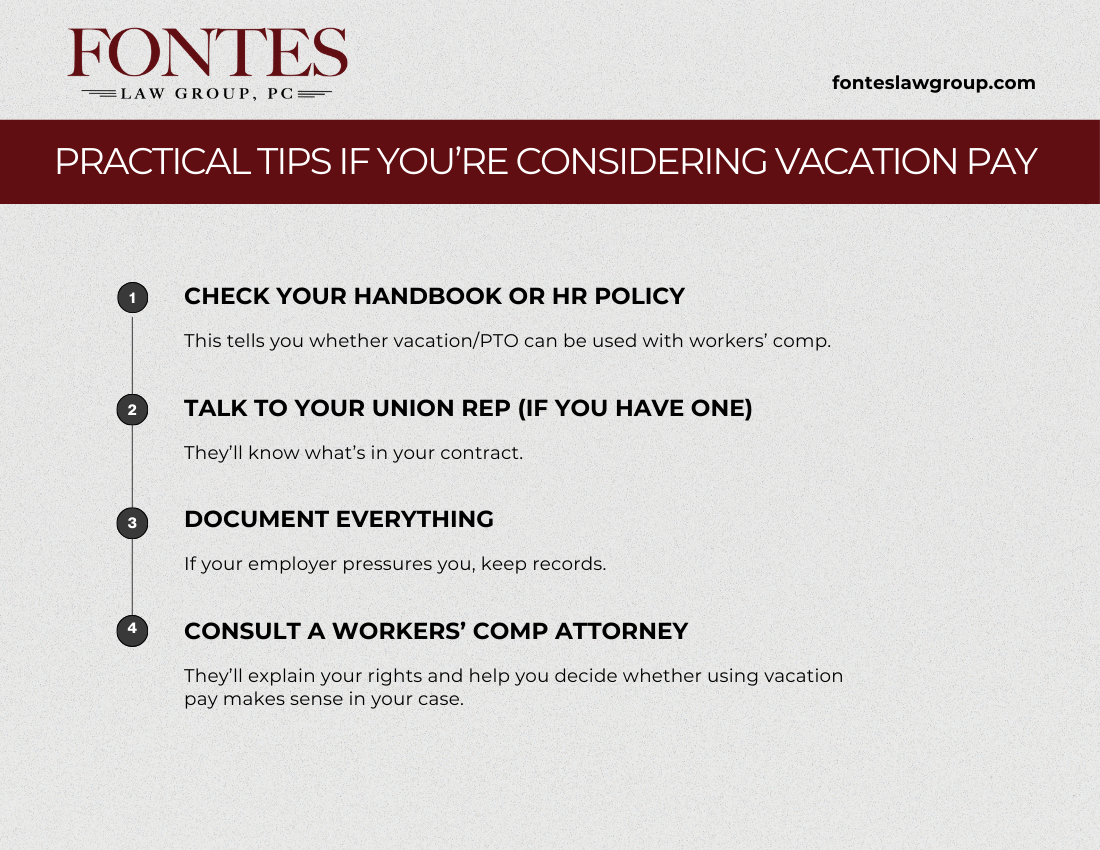Can You Get Vacation Pay While on Workers’ Comp?
When you’re hurt on the job, workers’ compensation is meant to cover medical bills and replace part of your lost wages. But it usually doesn’t replace your full paycheck.
This is why some injured employees ask: can I use my vacation pay or PTO (paid time off) to make up the difference?
The short answer is yes, sometimes you can.
But it depends on your employer’s policies, your union agreement (if you’re in one), and the specific details of your workers’ comp claim.
Let’s break this down step by step so you know what options are available and how to make the best decision for your situation.
Can You Use Vacation Pay and PTO While on Workers’ Comp?

If you’ve built up Paid Time Off x(PTO), you may be able to use it as extra income during your recovery. That could include vacation days, sick leave, personal time, or even holiday pay.
Whether that’s a smart financial move depends on your employer’s rules, California law, and how much financial flexibility you want once you’re back on the job.
In California, the law does not prevent you from using vacation time while receiving workers’ comp. But there are some important details:
- Employer policies control how vacation/PTO is used. Your employer decides whether you can apply for unused vacation days while you’re off work. Some allow it, others don’t.
- You cannot “double dip.” Workers’ comp pays wage replacement for the time you’re medically unable to work. If you’re also getting vacation pay, your employer may offset one against the other.
- It’s optional, not required. You can’t be forced to use your vacation or sick days to cover a work injury. Workers’ comp should pay benefits separately.
According to the California Department of Industrial Relations (DIR), workers’ comp benefits are designed to cover medical care, wage loss, and related costs. Vacation pay, by contrast, is considered part of your employment benefits package, not a workers’ comp benefit.
How It Usually Works in Real Life
Here’s how vacation pay interacts with workers’ comp in everyday situations:
If you’re fully off work: Workers’ comp pays temporary disability benefits (partial wages). You may ask your employer to also pay out vacation days to make up some of the lost difference.
If you’re working light duty: You may be earning less than your regular pay. Some employers let you use vacation hours to “top off” your paycheck so you don’t fall behind.
If you separate from the company: California law requires employers to pay out any unused vacation or PTO when you quit or are terminated, even if you’re on workers’ comp (California Labor Code §227.3).
Union Contracts and Collective Bargaining Agreements
If you’re part of a union, your rights may be spelled out in a collective bargaining agreement. These agreements sometimes include specific language about how vacation pay interacts with workers’ compensation.
For example, some may guarantee that workers can use accrued vacation or sick time while recovering from a workplace injury.
Potential Downsides of Using Vacation Pay
While it may sound good to use vacation time during recovery, there are trade-offs:
- You won’t have vacation days left once you return to work.
- Some employers require you to exhaust PTO before short-term disability benefits kick in.
- Using vacation pay might reduce the amount of “back pay” you could receive if your workers’ comp case involves disputes or delays.
It’s important to weigh whether the short-term cash relief is worth losing that future flexibility.
What the Law Says About Forcing Vacation Use
California law is clear: employers cannot force you to use vacation or PTO for a workers’ comp injury. Workers’ comp benefits must stand on their own. That said, some employers try to encourage or even pressure employees into using PTO to cover gaps. If this happens to you, it may be time to get legal advice.
The U.S. Department of Labor also emphasizes that workers’ comp and wage laws are separate systems (dol.gov). That means your vacation benefits are considered earned wages, and workers’ comp is insurance coverage for injuries.
Fontes Law Group’s Perspective
At Fontes Law Group, we’ve seen how confusing this gets for injured workers. You’re already stressed about your health, and then you have to figure out complicated rules about pay, PTO, and benefits.
Our team helps clients understand:
- How workers’ comp benefits are calculated
- Whether vacation pay or PTO can be used alongside benefits
- What to do if an employer denies benefits or pressures you to use vacation days
We fight to make sure injured workers don’t get taken advantage of during one of the hardest times of their lives.

FAQs: Vacation Pay and Workers’ Comp
Q: Can I cash out my vacation pay while on workers’ comp?
Yes, if your employer allows it. In California, if you leave the company, they must pay out your unused vacation regardless.
Q: What happens to my vacation pay if I’m out on workers’ comp for months?
Your vacation hours continue to belong to you, but whether they keep accruing depends on your employer’s policy. Some companies stop vacation accrual while you’re off work, while others allow it to continue.
Q: Can I use sick days and vacation time together with workers’ comp?
In some cases, yes. If your employer allows it, you may be able to use sick leave or vacation days to cover the gap between workers’ comp payments and your regular paycheck. Always check your company’s rules first.
Q: Do I lose my vacation pay if I get fired while on workers’ comp?
No. California law requires employers to pay out any unused vacation time when your employment ends, even if you are out on workers’ comp.
Q: Can I get holiday pay while I’m on workers’ comp?
Holiday pay is separate from workers’ comp benefits. Some employers will still pay it if you’re considered an active employee, but others won’t. You’ll need to check your employee handbook or talk to HR.
Final Thoughts
Vacation pay and workers’ comp don’t always play well together. Workers’ comp is supposed to cover your lost wages and medical care. Vacation pay is separate, but you may be able to use it to fill financial gaps. Whether that’s the right move depends on your situation, your employer’s policies, and your long-term goals.
At Fontes Law Group, we help workers across Southern California navigate these choices with compassion and clarity. With offices in Santa Ana and Riverside, and a bilingual team ready to serve in English and Spanish, we’re here to make sure you don’t go through this process alone.
Need guidance on your workers comp case? Reach out today for a free consultation.
